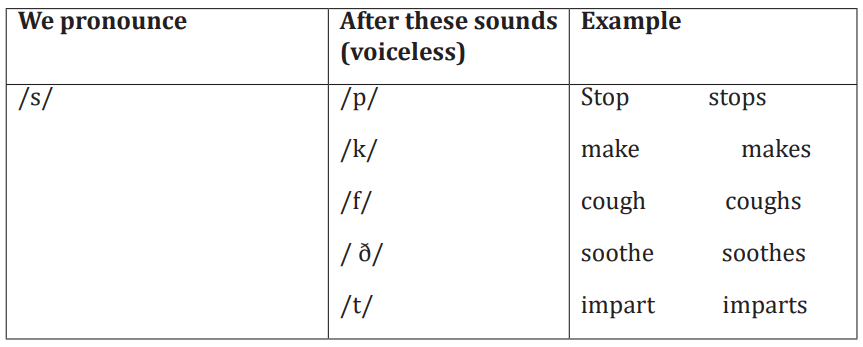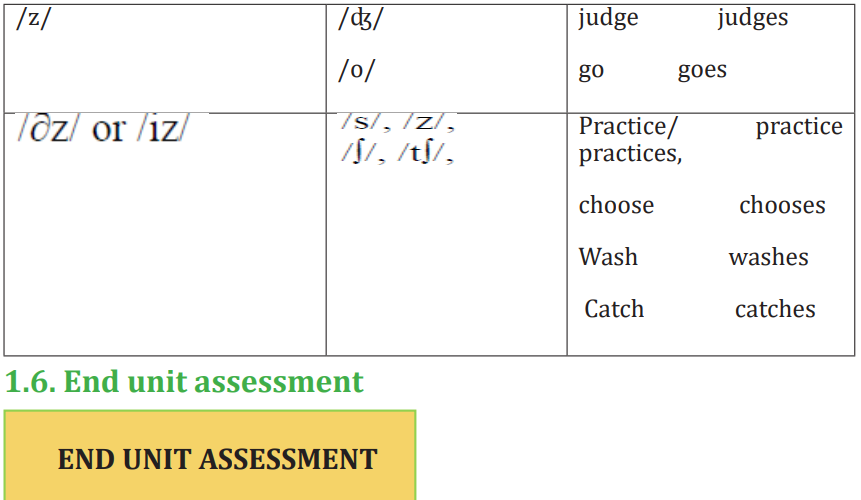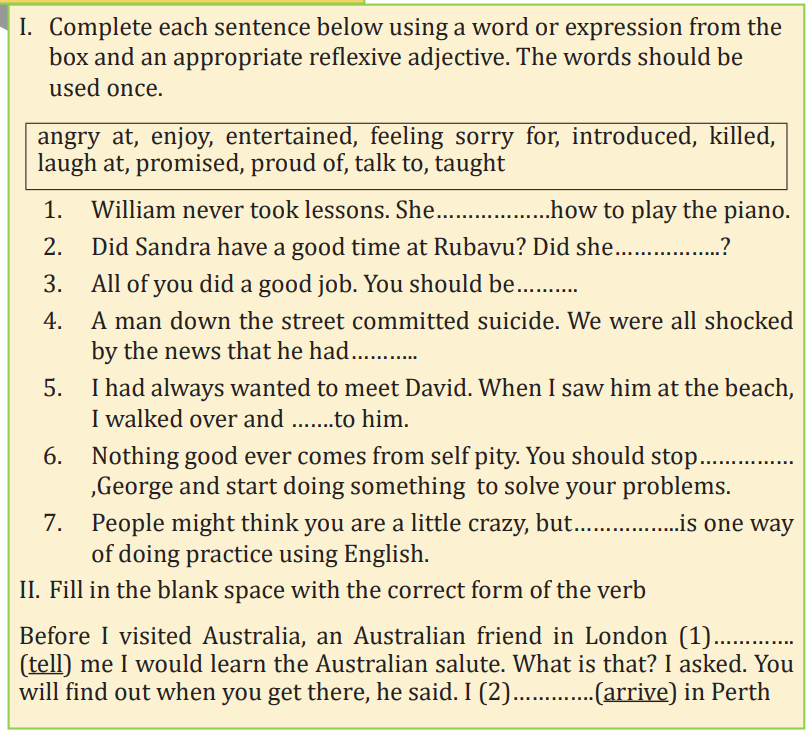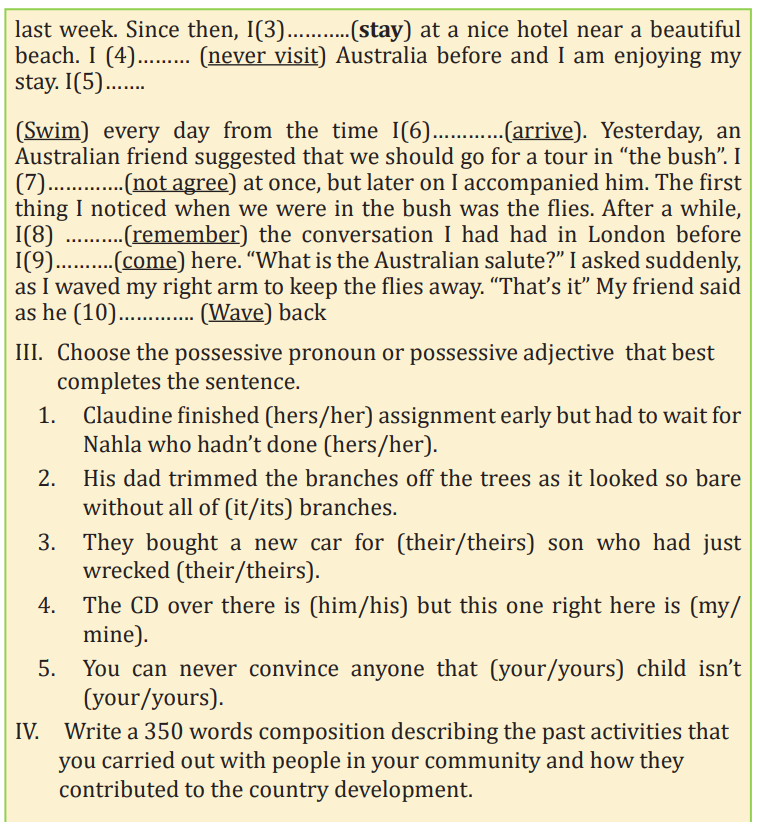UNIT 1: MYSELF AND MY COMMUNITY
LEARNING AREA: ORAL AND WRITTEN COMMUNICATION Key Competence: To use language learnt in the context of myself and my community
INTRODUCTORY ACTIVITY

While interpreting these pictures, answer the following questions:
1. Why do you think mutual support is needed in the community?
Describe the role of local government authorities in your community using present simple tense.
2. Explain the role of community leaders as observed in the pictures above.
3. Compare and contrast urban life and life in rural areas.
4. If you were a community leader, what suggestions would you give to
improve community members’ welfare?
1.1. Describing the community
1.1.1. LEARNING ACTIVITY
Reading and text analysis
Text: New ways for an old village
The more I try to recall the earliest impressions of my childhood, the more surprising the result becomes. I can see myself as a new-born baby, barely a day old, possibly a few hours old, receiving the vigorous attentions of my maternal grandmother. Who could imagine that I would become an eminent surgeon?
She sits on a stool in the middle of an airy bedroom, a proud contented look on her face. On the floor, beside her is a broad metal basin, more than two feet in diameter, and about eight inches deep. This is half-filled with warm soapy water. Across her knees is spread a waterproof sheeting. On this she supports me with her left hand, while with the other she anoints me from head to foot with a rich lather of native soap.
My eyes are tightly shut, my mouth wide open in a yell of protest. As she vigorously rubs away, the yelling continues, and the roomful of women looks on approvingly. Unto us a son is born! They cry. Having thoroughly lathered me, my grandmother dips me into the basin of water, and scoops the contents all over me. As the water runs into my mouth, I shut up sharp.
Half choking, I gulp, swallow, and let out a yell of even louder protest. My grandmother ignores me, and carries on with her task. Then she lifts on to her lap, and towels me briskly. The assembled ladies take a look at my fat little face with its squashed nose and puffy little eyes, and say admiringly. ‘Just like his daddy!’
There is a coal pot, that is an open charcoal brazier, burning brightly near at hand. From it, someone lifts out a small oval stone about six inches long, worn and smooth. Normally, it is the “daughter stone” which is used to grind pepper, spices, ground nuts and other cooking ingredients on a large flat mother stone. Now it has been washed and brought to a red heat, and then so thoroughly sterilized. Some water is poured on it, causing a fierce sizzle: but it still remains dull red-hot.
A little piece of clean cotton cloth is dipped in a glass of water, squeezed out, and pressed on the stone. It is then lifted up, allowed to cool a bit, and then applied
firmly to the end of the birth cord dangling from my navel. Thus sterilized, the cord is folded and bandaged into position. This will be repeated daily until it drops off.
The medicine, don’t forget the medicine!” They remind her, as the door opens, and somebody comes in with a small half-gourd full of a special kind of herbal tea. My grandmother tastes it to check its temperature, and lifting me up gently she pulls her skirt well up her plump left thigh. She lays me along this limb, with my head over her knee, her left arm supporting my back and head and holding the gourd, some of the contents of which she pours into her right hand held cupped against my mouth.
She heaves in a quantity of the liquid smartly as I open my mouth to cry. I choke, swallow instinctively, take a good breath and open my mouth wide for a tremendous yell.
But she is ready, and immediately I receive another dose into the back of my throat. I splutter, shut my eyes tight, kick out, go stiff with anger and open my mouth wide for a truly nasty yell of protest: but again she is ready and heaves in the right quantity of medicine with practised aim. So the duel continues, each yell stopped by a dose of tea, followed by a swallow, a holding of the breath, and an attempt at an even louder yell, which meets with the same fate, until the gourd is empty. So I have my first drink in this world...
• Comprehensive questions
1. Who is talking in this passage?
2. From your own experience, do you think it is likely for anyone to remember
as far back as the day she or he was born? What other explanation can
you think of for the “memory” described in this passage?
3. Half-choking: What is making the baby choke? Why is half used here?
4. In the text above, My grandmother ignores me means:
a. She puts me to one side
b. She pays no attention to me
c. She pays no attention to my yelling
5. Explain towels me briskly in your own words.
6. What was the purpose of heating the “daughter-stone” and what was it
used for?
7. To check the temperature means to:
a. stop the temperature from going high
b. see if the temperature is right
c. stop the temperature from going too low.
8. So the duel continues. What is called a duel, here?
1.2.1. APPLICATION ACTIVITY
Vocabulary and sentence writing
1. Explain the following words as used in the passage above.
a. ingredients
b. splutter
c. charcoal brazier
d. Heave
e. sterilized
f. sizzle
2. Make a sentence with each of the above words
1.3. Recounting past activities
1.3.1. LEARNING ACTIVITY Reading and text analysis

• Text: My visit to Rubavu District
Read the following passage carefully and answer the questions that follow.
Last August, I went to Lake Kivu with my family. I was so excited because it was my first time to visit lake Kivu. We spent five days there. The first thing which came to my mind at the first time I arrived there was beach. When I stepped out from the bus and breathed, I sniffed the smell of lake water.
It made me more excited to start my exploration. My family and I visited many interesting places in Rubavu. We went to the hot spring in that area and it was my first time to taste and bathe with natural warm and salty water from the ground. My visit to BRALIRWA breweries and the international market made my stay wonderful.
I spent a great part of my time at the beach where I met lovely people. Even though there are so many lovely but noisy places in Rubavu, I was not bored with them because each one was unique. Kivu beach lies above the surface of water. From that place we could have an attractive view of the lake which was the most gorgeous scenery I have ever seen. There were both local and foreign tourists surfing or just sunbathing.
The best time to come to Kivu beach is in the evening to see the sunset. It was so romantic. It is really a very nice beach to visit. The wind and waves were just right to do water sport. I did not want to miss this chance and tried to do parasailing. At first, I was so afraid to approach the lake because I feared that the wind would blow me into water.
When the sailor took us in a boat I turned around to see how long we had travelled. I could see the view of Rubavu city from the water. Finally, we came to the end of my trip in Rubavu. I felt that time run so fast.
I was so sad because I had to leave that beautiful place. In Rubavu, I did not only enjoy my stay but I also visited and learned about its different beautiful places which are part of its touristic attraction. I would always remember my beautiful trip to Rubavu and I promise myself to go back there again at least one more time.
Adapted from African Child, by Camara Laye
• Comprehension questions
1. Why did the speaker and his family visit Rubavu?
2. Which attractive places did they visit?
3. According to you, why were they happy after visiting those places?
4. Where did the speaker spend most of his time during his stay in Rubavu?
5. Why is the evening the best time to visit Kivu beach?
6. Explain the reason why the speaker was afraid of parasailing?
7. According to the passage, does the speaker keep good memories about his visit to Rubavu? How do you know?
1.3.2. LEARNING ACTIVITY
Vocabulary, essay and informal letter writing
1. Match the words in the table below with their respective meanings

2. Suppose that you have a friend who lives abroad and wishes to visit Rwanda. Write a letter to him describing another touristic place that he should visit during his stay in Rwanda.
3. Write a 300 word essay about “the contribution of tourism to the development of the Rwandan community”
1.4. Language structure: The present simple tense, reflexive
pronouns and possessive adjectives
1. The present simple tense
Read the following summary about the use of present simple tense and carry out the task that follows.
The present simple tense is the most basic tense in the English language. There are 7 uses of this tense in direct speech:
a. Facts, generalizations and universal truths
b. Habits and routines
c. Permanent situations
d. Events that are certain to happen
e. Arrangements that we can’t change (timetables, official meetings)
f. State verbs (be, have, suppose, know etc.)
g. Narrations, instructions or commentaries
A. Facts, generalizations and universal truths
The present simple tense is used when talking about universal truths such as laws of nature or things we believe are, or are not, true. It’s also used to generalize about something or somebody.
Examples:
• Water boils at 100 degrees Celsius. Universal( Truth)
• It is a big house. (Fact)
• The Earth goes around the Sun. (Universal truth, fact)
• Dogs are better than cats. (Generalization)
• Berlin is the capital city of Germany. (Fact)
• The elephant doesn’t fly. (Fact)
• London is the capital city of France. (Fact)
• Kivu lake is located in the west of Rwanda.(fact)
B. Habits and routines
We also used this tense to describe actions that happen frequently. For example: habits, routines, tendencies.
Examples:
• We leave for work at 7:30 AM every morning. (Routine)
• My husband watches the TV in the evening. (Habit, Routine)
• Susan often meets with her friends after school. (Habit, Routine)
• They usually play football on Sunday. (Habit, Routine)
• Mark rarely visits his sick grandmother.(Tendency)
• James usually tells lies. (Tendency)
• Every last Saturday of the month people in Rwanda get together to
perform a type of community work known as “Umuganda”.(Routine)
Adverbs of Frequency
The Present Simple is often used with frequency adverbs including the following:

Here are a few examples on how to use these frequency adverbs in sentences:
• I always go to church on Sundays.
• I never eat anything after 10 PM.
C. Permanent situations
The present simple tense applies for actions that last a relatively long time.
Examples:
• I live in Musanze district
• He works as a receptionist.
• Margaret drives a Volkswagen.
• Jane teaches Mathematics at high school.
• Summer follows Spring,
• The best time to come to Kivu beach is in the evening to see the sunset
D. Events certain to happen
The present simple tense is also used when an event is certain to happen in the future.
Examples:
• My grandmother turns 100 years old this July.
• Winter starts on 21 December.
• The concert begins at 7.30 next Friday evening.
E. State Verbs
Some verbs such as like, love... are called “state verbs” when they refer to
“states”. A state action has neither a beginning nor end. It can’t be controlled
and that’s why it’s not normally expressed in present progressive tense.
Examples:
• I like swimming.
• We know this man.
• She loves her baby more than anything (not is loving)
N.B. Some of the state verbs used in the present simple tense can also appear
in the present continuous tense. This is typically when they have an active meaning or emphasize change.
Examples:
• I’m thinking of moving to San Francisco.
• I start loving your new haircut!
There are five groups of state verbs. They refer to : feelings ( like, love, etc) ;
thoughts/belief (think, understand, etc); wants (want, prefer, etc); perception ( see, hear, etc); being/having/owning (appear, seem, belong, etc).
F. Future Arrangements
The present simple tense is used when talking about events whose schedule
can’t be changed (for example, an official meeting or a train departure).
Examples:
• The meeting starts at 4 PM.
• The train leaves at noon.
• First you weigh the ingredients.
Write a paragraph about daily habits in your community with adverbs of frequency.
2. Reflexive pronouns
Read the following summary about the use of reflexive pronouns and carry out the task that follows.
The reflexive pronoun is used to refer back to the subject of a sentence. In this case the “doer” and the recipient of the action are one and the same. They include: myself, yourself, herself, himself, itself, ourselves, yourselves, and themselves.
It is formed by adding –self or –selves to personal pronouns.

Reflexive pronouns are often used:
1. As objects when the subject and object are the same person/thing/animal.
Example: I told myself not to worry.
They are commonly used as the objects of the verbs such as burn, hurt, cut,
enjoy, teach, introduce, and look at. There are also common phrases with
reflexive pronouns, such as enjoy yourself (have a good time), help yourself
(take something if you want), and behave yourself (be good).
2. To emphasise that a specific person/thing/animal is being referred to
and nobody/nothing else.
Examples:
• I organised this event myself.
• I’m sure he is aware of the changes. He himself spoke to me about it.
Exercise:
Put in the black spaces reflexive pronouns
Complete the sentences with the appropriate reflexive pronouns
1. Tommy told a lie. He was ashamed of ……………………..
2. Masako cut ………………………….while he was chopping vegetables.
3. People surround ………….with friends and family during holidays.
4. Omar thinks Oscar is telling the truth. So does Ricardo. I…..don’t believe Oscar’s story for a minute.
5. Now that their children are grown, Mr. and Mrs. Grayson live by………………
6. A: should I marry Steve?
B: no one can make decision for you, Ann. Only you…….can make such an important decision about your own life.
7. Emily and Ryan, be careful! You are going to hurt……………………..
8. A: I hate my job.
B: I envy Jackob. He is self-employed. Yeah. I would like to work for ……too
9. Jason, you need to eat better and do exercise. You should take better care of………
10. People who take care of…………have better chance of staying healthy than those who don’t.
3. Possessive adjective
Read the following summary about the use of possessive adjectives and carry out the task that follows.
A possessive adjective specifies the owner of a particular person or object.
These adjectives are: my, your, her, his, its, our, and their

Who was the first black president to lead South Africa?
What are the characteristics of a good leader?
Who is the president of the republic of Rwanda?
Which prominent leaders inspire you in Rwanda?
Where is my computer?
b. Note: Wh-words are used to ask about specific qualities, times, places, people and so on. The question word is used at the beginning. If there is a helping (auxiliary) verb that precedes the main verb (for example: can, is, are, was, were, will, would...), we add the question word and invert the subject and the helping (auxiliary) verb. Below is table showing a list of question words and example sentences:

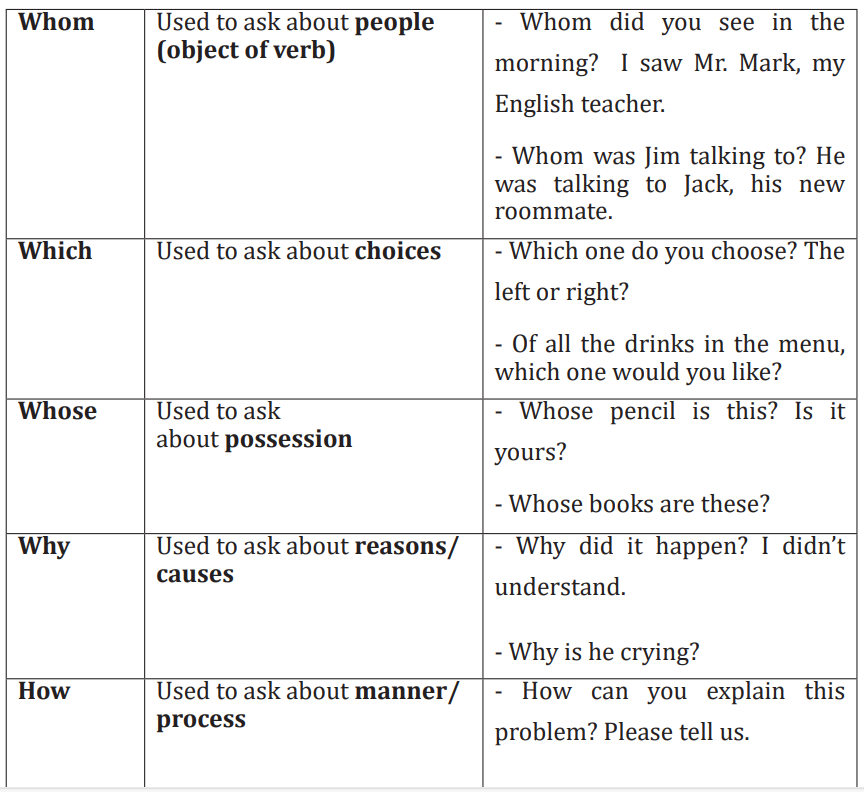
1.5. Spelling and pronunciation with some verbs in present simple tense
